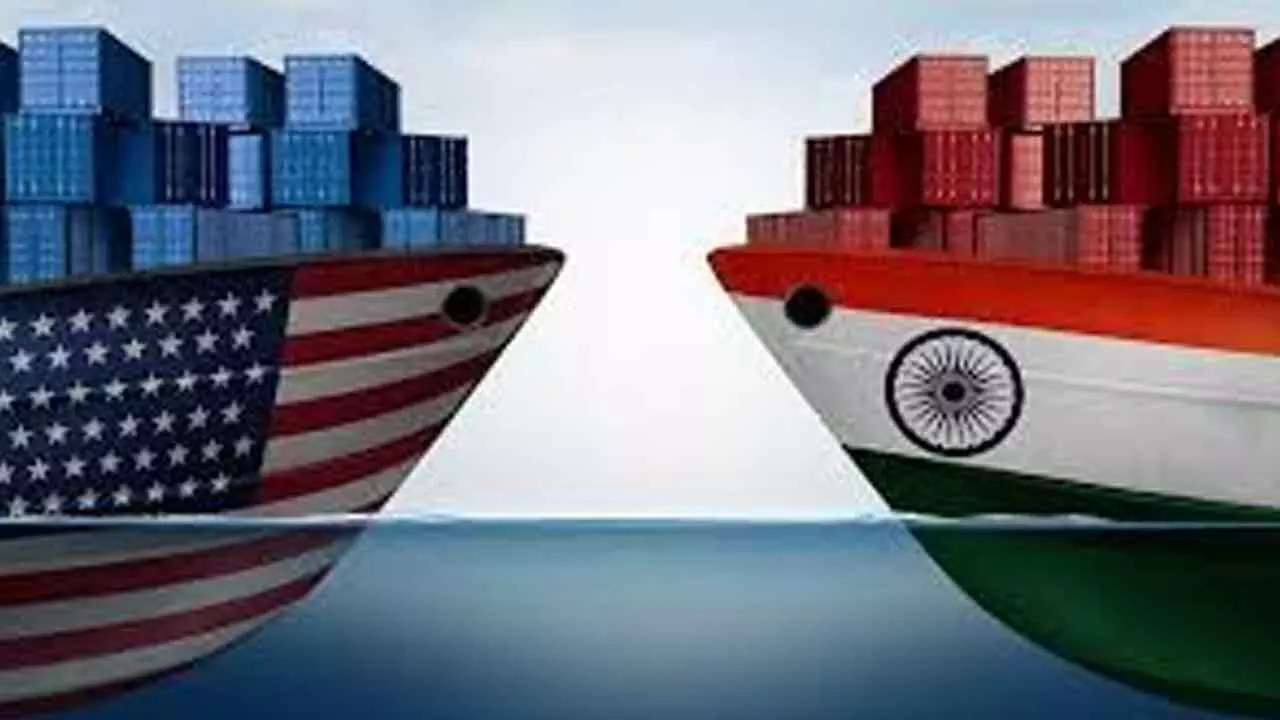India should resume its trade negotiations with US on priority basis
India and USA must work towards a long-awaited trade agreement that achieves an amicable settlement
India should resume its trade negotiations with US on priority basis

Although India has faced similar challenges before, the current situation is especially tricky, as it cannot afford to harm its long-standing strategic partnership with the US. For India, the US relationship remains of utmost importance—both strategically and economically. At the same time, in today’s changing circumstances—where countries are increasingly prioritising national interests over global cooperation, particularly under former US President Donald Trump’s “America First” policy—India must also strengthen ties with other partners
In recent days, amidst the imposition of an additional 25% tariff by the United States - on top of the earlier 25% penalty imposed on India for purchasing Russian oil and defence equipment - Washington has argued that India is indirectly helping Russia fund the war in Ukraine.
India has strongly defended its position, calling the US action unfair, unreasonable, and unjustified, noting that oil purchases from Russia are in its national interest. New Delhi has also pointed out that singling out India is discriminatory, as China and several European countries continue to buy Russian oil. As a result, proposed trade negotiations and agreements with the United States have stalled.
This has put Indian exporters to the US in a difficult position, prompting calls for special government financial packages and incentives to help them maintain export levels. The government has been actively discussing alternatives with trade and export organizations, both to ease the immediate burden and to diversify exports by leveraging recent free trade agreements with the U.K. and other countries.
Although India has faced similar challenges before, the current situation is especially tricky, as it cannot afford to harm its long-standing strategic partnership with the U.S. For India, the U.S. relationship remains of utmost importance—both strategically and economically. At the same time, in today’s changing circumstances—where countries are increasingly prioritizing national interests over global cooperation, particularly under former U.S. President Donald Trump’s “America First” policy—India must also strengthen ties with other partners. Many analysts believe that these tariffs are a temporary irritant and that both sides will eventually reach a mutually acceptable trade agreement.
In this context, Prime Minister Narendra Modi’s recent visit to China for the SCO Summit 2025—his first in seven years—was significant. The meeting came despite ongoing border tensions between India and China, such as the Galwan clashes, which resulted in casualties on both sides. Modi’s talks with Chinese President Xi Jinping marked a step toward easing tensions, with both leaders expressing a desire for partnership rather than rivalry. At the same summit, Modi also strengthened ties with Russian President Vladimir Putin.
The SCO Summit, attended by more than 25 heads of state, attracted global attention, especially due to the trilateral presence of Modi, Putin, and Xi. Shortly after, former U.S. President Trump remarked: *“Looks like we’ve lost India and Russia to deepest, darkest China. May they have a long and prosperous future together.”* In response, India reiterated that its relationship with the U.S. is anchored in mutual respect, shared interests, and robust people-to-people ties.
MEA spokesperson Randhir Jaiswal emphasized that the India-U.S. partnership has weathered many transitions and challenges, adding that India’s ties with any country must be seen on their own merit, not through the prism of a third party. However, U.S. trade advisor Peter Navarro continued to criticize India, accusing it of being an “oil money laundromat for the Kremlin” and engaging in “strategic freeloading.” These comments have been firmly rejected by India as inaccurate and misleading.
Despite these tensions, India has responded with restraint, recognizing the importance of maintaining strong ties with Washington. Over the past two decades, India and the U.S. have built a substantial strategic partnership in defence, security, trade, and technology. Modi himself, responding to Trump’s “always be friends” remark, affirmed that India fully reciprocates those sentiments and remains committed to a positive and forward-looking partnership.
That said, Trump has repeatedly expressed dissatisfaction with India’s oil imports from Russia, calling the trade relationship “a one-sided disaster.” He argued that U.S. businesses face high Indian tariffs while India benefits from significant access to U.S. markets. Though he acknowledged recent Indian offers to cut tariffs, he said they were “too late.”
Meanwhile, India has strengthened ties with Russia, with President Putin and Prime Minister Modi reaffirming their close relationship. Economically, India is better positioned to handle these challenges. Recent Q1 2026 GDP growth figures and an upgrade by S-&P signal resilience.
The government has also advanced reforms such as GST 2.0, reducing the previous four tax slabs to two (5% and 18%). This is expected to boost domestic demand, capacity expansion, and private sector investment, benefiting both farmers and MSMEs. While GST 2.0 is not a direct response to U.S. tariffs, it will nonetheless support domestic manufacturing and consumption.
Still, resuming trade talks with the US remains urgent. Both sides must work toward a long-awaited trade agreement that achieves an amicable settlement. Positive results, it is hoped, will come soon.
(The author is former Chairman & Managing Director of Indian Overseas Bank)

